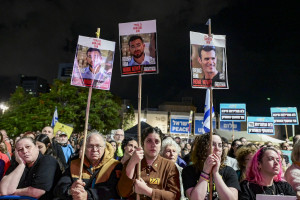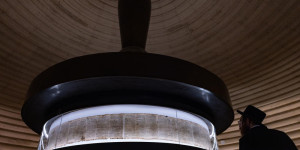Some conclude Israel is closing its gates towards diaspora Jews, especially from NY

If you listen to Diaspora Affairs and Combating Antisemitism Minister Amichai Chikli, you might arrive at his conclusion that the doors are closing on American Jews, especially those from New York.
So convinced of the need to find safer harbors, Chikli believes that “New York will never be the same again, especially not for its Jewish community,” which is why he extended an invitation to New York Jews “to seriously consider making their new home in the land of Israel.”
Yet, does he really know to whom he is offering that new alternative home, and, more importantly, does he speak for those who make the final decision as to whether prospective immigrants will be warmly welcomed?
Allow me to provide an analogy that will serve to clarify why I am asking these questions. Think of it this way. You love entertaining people in your home. Your spouse – not so much. You just ran into old, dear friends you haven’t seen since your school days. Wanting to catch up with them, you enthusiastically invite them over for dinner, looking forward to reconnecting and having a memorable evening.
But when you tell your wife, not only doesn’t she share your enthusiasm, but she tries to come up with a million excuses as to why she cannot be available to spend time with your friends or lavish them with a great meal that would delight everyone.
As sad as it sounds, this imaginary scenario can be applied to the issue of immigration to Israel, better known as aliyah.
An indifferent Interior Ministry
In this case, Chikli is the enthusiastic husband who extends the invitation, only too happy to connect the Diaspora Jews, who now find themselves imperiled in their familiar home, to the land he loves. Excited to host them, he asks them to really consider coming.
Regrettably, the reluctant and indifferent spouse is the Interior Ministry, run by a handful of overzealous bureaucrats who take their orders from the country’s religious parties and leaders who are not keen on accepting all Jews.
Rather than see many of their American counterparts as not only worthy, but also in need of a safe home, they, instead, carry out the vetting process to an extreme – demanding an introduction letter from a local rabbi, and, in many cases, even obscure family documents that are next to impossible to access.
This is their way of making it difficult, or even impossible, for the unaffiliated, the assimilated, and the intermarried from being accepted in their ancestral homeland.
Turning their backs on Jews
For the ultra-Orthodox community, which actually comprises a 30% minority of all Israelis, the thought of unobservant Jews who may only have a very minimal connection to their ethnicity is viewed as a frightening threat to the perpetuation of the type of atmosphere they would like to sponsor and strengthen.
Since Jewish law differs from the Hebrew scriptures, where the paternal line was the determining factor of one’s birthright, conversely, it is only the children of Jewish mothers who are seen as authentic, bona fide Jews. Only they are granted the right to legally marry in Israel, and solely if the wedding is performed by an Orthodox rabbi – not a Conservative or Reform member of the clergy.
Obviously, a troubling issue for the very religious, their enthusiasm level for sharing their home with anyone other than the offspring of two Jewish parents is not a delightful prospect. But, like it or not, this is the story of a sizable majority of American Jews, especially many from New York who intermarried and are, consequently, not active or connected in any meaningful way to their culture or people.
Rather than seeing this complex situation as a golden opportunity to welcome these families with open arms, demonstrating to them that they are wanted and valued, especially at a dangerous time, they callously look upon them as a liability, not worth taking on.
But can any Jew afford to turn their back on other Jews, just because they are less involved in living a Jewish lifestyle? Is there any moral justification that would make that right?
The opportunities in Israel
There is another way to look at this issue.
Doesn’t it stand to reason that bringing them to the one country that could connect them to their history, their culture, their meaningful holidays, and their revived language would make a significant impact on them?
Is the level of fear and prejudice so great that they would rather allow assimilated New York Jews to fend for themselves, at a time when their new mayor can’t even bring himself to condemn the evil intent behind the phrase “globalize the intifada?”
Why isn’t there a strong personal conviction in each religiously observant Israeli, acknowledging that the great pride and honor of our collective peoplehood will positively affect those who have, until now, lived without it?
Do they think that hearing the singing of our national anthem, “Hatikvah,” will not give them goosebumps as it does each one of us who live here?
Will these newcomers, upon hearing the annual siren sounded on Holocaust Remembrance Day, not feel the same pain and passion for those among our people who perished in the camps, just because they were Jewish?
This is the more humane and positive way to react to the situation facing our Jewish brothers and sisters who thought that the Diaspora would be their final resting place but now realize that their days are numbered there.
An unavoidable move to Israel may be the only safe escape for them, and, yes, it will necessitate many changes on their part. It will require learning, possibly for the first time, their history as a people, the meaning of their biblical and national holidays, the culture and customs of the homeland, and so much more.
This is the price they will have to pay for failing to internalize that what happened to their ancestors, throughout the centuries, could not possibly happen to them. It will, no doubt, be their greatest challenge, but what is the alternative – let them be punished for not realizing this sooner?
Unlike the example of the indifferent spouse, who begrudgingly frowns at the invitation extended by her husband, Israel must not refuse them entrance, because, by doing so, they, too, could be preventing what could end up being the most memorable event in the existence of the Jewish homeland – not only saving more Jewish lives, but, most importantly, stirring the Jewish souls inside of them.
This article originally appeared on The Jerusalem Post and is reposted with permission.

A former Jerusalem elementary and middle-school principal who made Aliyah in 1993 and became a member of Kibbutz Reim but now lives in the center of the country with her husband. She is the author of Mistake-Proof Parenting, based on the principles from the book of Proverbs - available on Amazon.
You might also like to read this:

















